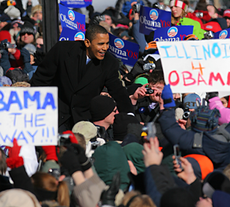Illinois: Does it really make a difference?

Erica Magda
Feb 4, 2008
Last updated on May 12, 2016 at 08:52 p.m.
The effect the Illinois primary election will have on the presidential campaign remains to be seen. However, what is certain is that the ensuing results have very little chance of either making or breaking any given candidate’s campaign.
For the first time in its history, the state of Illinois will be holding its primary elections along with more than 20 other states Feb. 5, also known as Super Tuesday.
State Rep. Renee Kosel, R-New Lenox, said the date was moved in an effort to give Barack Obama an edge in the state he represents.
“This is the first time we’ve ever not had the presidential candidates basically decided by the time we in Illinois got to vote,” she said. “We have people making real decisions whereas before, by the time our primary rolled around everything was pretty set and done.”
Get The Daily Illini in your inbox!
Illinois is one of the “blue” states that candidates expect to consistently go to the Democrats. As a result, they put little effort into campaigning within its borders, said Tracy Sulkin, assistant professor of political science.
“If Republicans thought they could win Illinois, they’d probably spend more time campaigning here,” she said.
Barack Obama, she added, is expected by most to win the state’s Democratic vote, so campaigning by Democratic candidates has been minimal as well.
The effect Illinois will have in the national race for the presidency will be determined by the number of delegates it sends to each party’s national conventions this summer.
On the Democratic side of the race, candidates need to win a majority of the 4,050 delegates available nationwide.
In Democratic primaries, delegates are distributed proportionally with regard to the percentage of votes each candidate receives in any congressional district.
“For the Democrats, winning delegates will be important, because it’s fairly certain that Obama is going to win the state,” Sulkin said.
Republican delegates are also distributed proportionally to the percentage of votes per candidate. Republican candidates need 1,081 delegates to win the nomination, 70 of which are available in Illinois.
“As far as the Republican side of the race goes, there really is no clear front-runner,” Kosel said. “People are constantly asking me who I’m voting for and to be honest with you, I’m not even sure yet. No one really knows how this election is going to turn out.”





